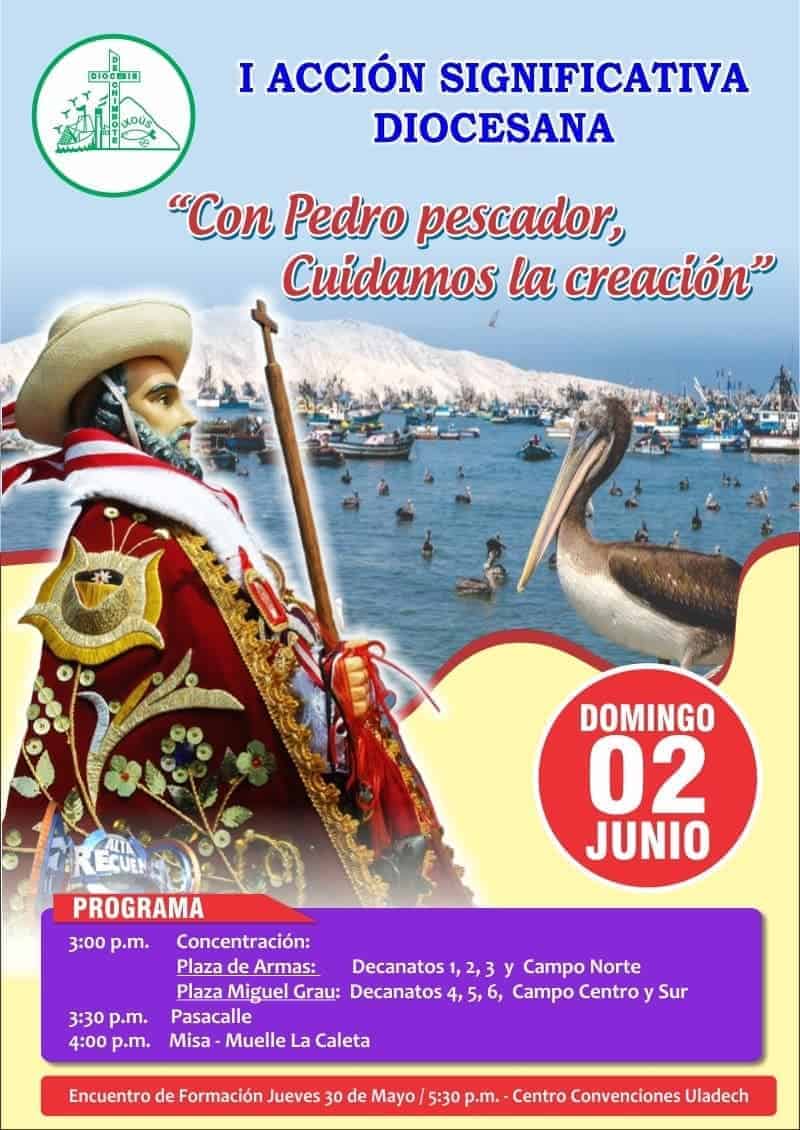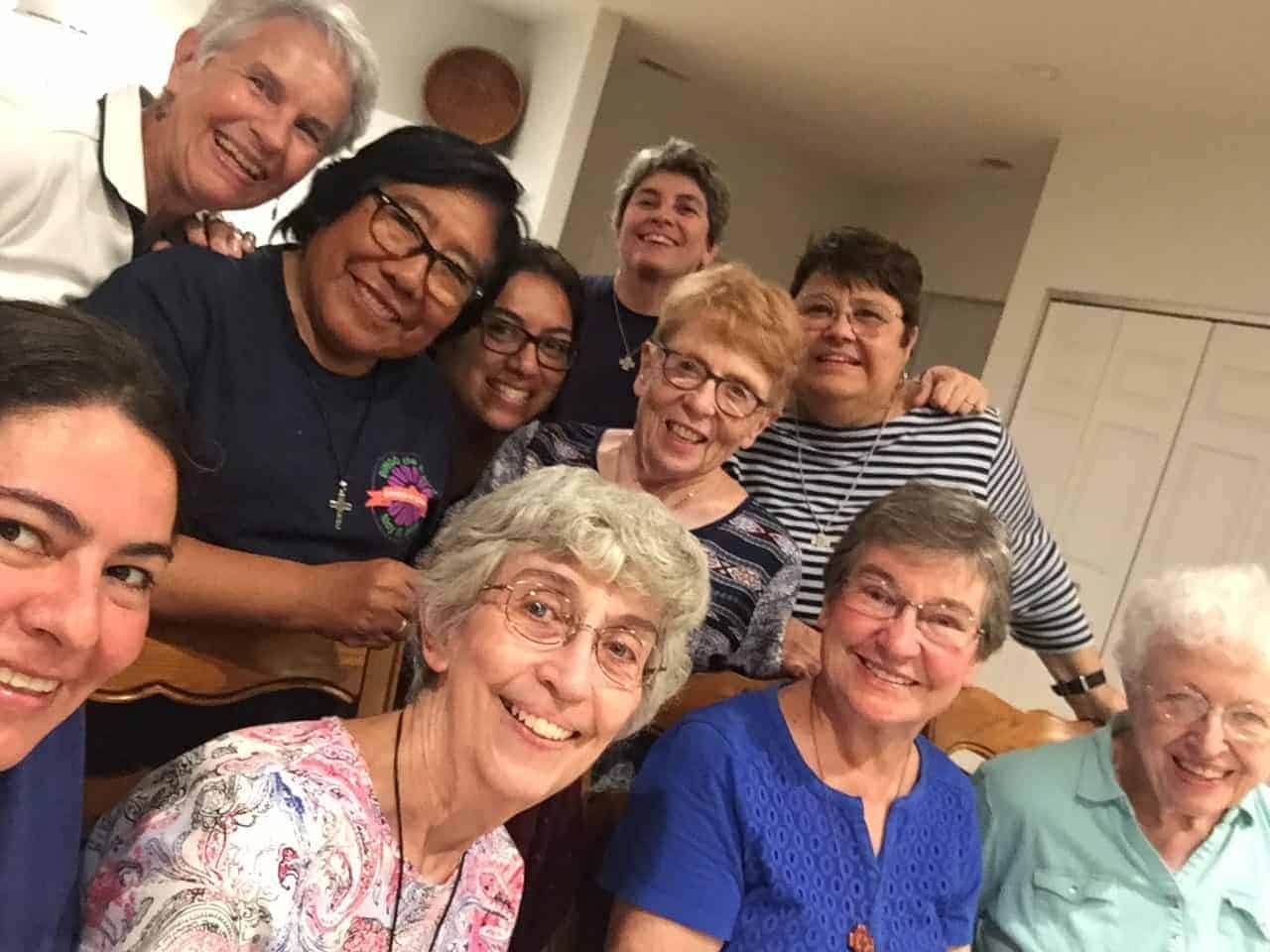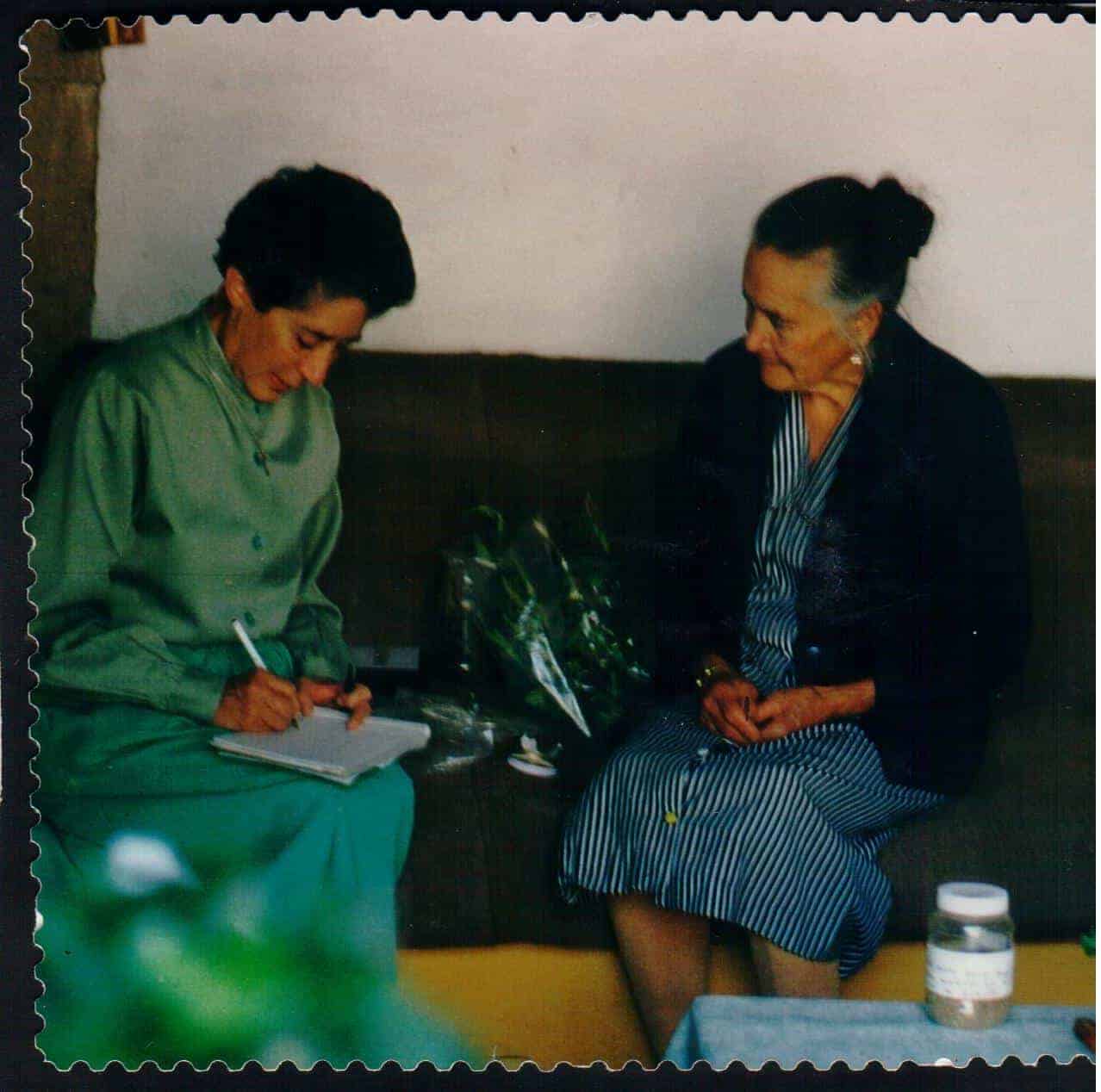FIRST DIOCESAN SIGNIFICANT ACTION: “WE CARE FOR THE CREATION, WITH PETER THE FISHERMAN”
Goal:
To raise awareness in the care of the creation (the common home) an example of the life of the Amazonian peoples.
Introduction:
The Church of Chimbote has become aware in the task of “Amazonizing the Church and Laudatosifying society” since 2015; that is to say, to become aware within the life of the Church of the care of creation, of the planet, which is our common home. And in turn to help all humanity to care for the planet because it is the creation of God, in light of the message of Laudato Si and the values present in the lives of the Amazonian peoples.
“Amazonizing the Church and Laudatosifying society”: A phrase invented by Cardinal Humes, president of the REPAM, and shared by the vice president, Cardinal Pedro Barreto, during the Social Week that the Episcopal Commission for Social Action – CEAS organized last November 2018.
Cardinal Pedro Barreto invited us to help spread this phrase and its meaning. With this great motivation and the agreements of our Diocesan Pastoral Assembly, we want our first significant action to have, for our faith formation, the great challenge of taking care of our common home as a content.
Taking a look at our reality:
So, is the Amazon the only thing we have to take care of on the planet?
It is true that we must take care of the Amazon and we will study it from the brochure of the REPAM published by the CAAAP (Amazonian Center for Anthropology and Practical Application): “AMAZONIA New Paths for the Church and for an Integral Ecology”.
Respect for the culture of indigenous peoples, mining, pollution of lakes, lagoons and rivers, the indiscriminate felling of trees, human trafficking, drug trafficking among other major problems that are unleashed by the depredation of the planet, it is our task in the care of the common home. Thus, we commit ourselves to live in the Manifesto of April 13, this year, at Cerro de la Paz, on the occasion of the Way of the Cross starting as a private Church, Holy Week 2019.
It is also true that we must worry about taking care of the planet in our real environment. Caring for our common home, the planet as Pope Francis asks of us, is the task of humanity, of every society and culture in its environment (Preparatory Document on Amazon: New paths for the Church and for an integral ecology. Vatican.2108. No. 15: “New Paths”)
The question for us in the Diocese of Chimbote – provinces of Santa, Casma and Huarmey, of the Department of Ancash in our Peru – has to do with the care of the sea, rivers and lagoons, land and air. But above all, the care for respect for a people that is forging itself in history, respect for their culture and human dignity.
In the pastoral agreements at the time of the prelature, the letters of Monsignor Carlos Santiago Burke, for Easter or Christmas or against social problems, marked the pastoral line in defense of creation: for the dignity of fishermen, iron and steel, teachers and their families. In short, the people face the pollution of the Bay.
Also, Monsignor Luis Bambarén achieved important agreements for the sake of the Chimbotan men and women. The “fishing canon”, “the fisherman’s benefits box”. The safeguard of the forest nursery. The Church has been present not only in the historical process but also in the history of the fishermen, the steelmakers -in their time-, the thousands of emigrants from our mountain range, who arrived in our coasts (Chimbote-Casma-Huarmey) in the hope for a better quality of life… and we formed this local Church.
We want to propose a reflection that helps us to inter-relate the problems of the Amazon and the care of our land:
1. Respect for the original communities of Panamazonia as well as for our people in the Diocese of Chimbote: The cities of Chimbote, Casma and Huarmey. Their culture: customs and traditions, spirituality and popular religiosity, etc.
2. To assume promoting awareness of caring for creation as a task to when, as a Church, our bishops of Panamazonia, from their prophetic voice, want to continue fighting for the people of the original communities, who share their culture and have joyfully embraced the gospel of Jesus Christ feeling part of our universal Church. This challenge is an example for our evangelizing task. Remembering the words of our blessed martyr Sandro Dordi would help us reflect:
“It is very important to know the reality that surrounds us and have priorities. For me, coming from a different ecclesial culture, it is necessary to overcome a mentality that could impede the formation of open and committed Christian communities in the change for the peoples. The integration and conversion of the missionary condition the validity of their presence in respect of the cultures they meet. The missionary is not a conqueror, but a servant and a friend. He cannot introduce himself with a foolish superiority that prevents him from walking beside others as an equal and servant. If people did not realize that we came from another nation, it would be better. This is especially true for people who are humble and tested by fatigue and poverty. In addition to the limitations that are evident, the faith and kindness of these people make us reflect a lot. There are authentic values to highlight. To be a missionary, it is necessary to be humble; that’s why we talk about service and exchange. It is good to work with discretion, eliminating the pride of those who think they know more, which is proper of Italian, Spanish, French, American and it must disappear, to be only a member of the people they serve” (Father Martín Salgado A. “WITNESSES OF HOPE: A catechesis for the community” Grafica Editora Don Bosco, Lima 2015. P. 57-58).
What do we know about the religious and civil history of our peoples that belong to the Diocese of Chimbote?
Have we taken care to incorporate “our evangelization, its culture and spirituality?
Have we respected the signs and gestures of popular religiosity?
3. Our bishops of REPAM fight against the extraction and everything that deplores and depredates the nature that our brothers and sisters of the Amazon have looked after since ancient times and have become one with the nature that God has given them. “On the other hand, the threat against the Amazonian territories” also comes from the perversion of certain policies that promote “the conservation” of nature without taking the human being into account and, in particular, the Amazonian brothers and sisters who inhabit them. “The orientation of Pope Francis is clear:” I believe that the main problem is how to reconcile the right to development, including also the right of social and cultural type, with the protection of the characteristics of indigenous people and their territories. “In this sense, the right to price and informed consent must always prevail “(Preparatory document, No.5).
4. It would be convenient to ask ourselves a question in our evangelizing task: To what extent do we protect our environment? In the history of our particular Church and in the city of Chimbote, we have had pronouncements in favor of the environment and the people: (pastoral letters of 1978-79, work was done in favor of the fishing canon in the 80s-90s, pronouncements and work of ONG Natura, among others). Remember that the lung of the city “the forest nursery” has been entrusted to the care of the diocese, as well as the hill of youth.
 Today we have groups that are raising awareness of the care of the Bay. It may not be enough to clean the beach and the rubbish in front of Caleta Urbanization.
Today we have groups that are raising awareness of the care of the Bay. It may not be enough to clean the beach and the rubbish in front of Caleta Urbanization.
Is it not the time that the Church – we, clerics and laity – together with civil society, should have a greater political influence to demand democratically elected ones, that it is time to decontaminate the sea of our beautiful Chimbote Bay?
Is it important to think that before making a mega harbor, the chimbotan men and women, we also deserve to instill “the good living” that our brothers and sisters of the Amazon defend in their relationship with what God has given us since the creation and to be able to assume that it is relevant to have a better quality of life, health and education?
How long will we endure environmental pollution?
It is true that there are municipal laws that regulate fishing factories, over chimney filters, but “a few of us ” are still being killed each “night” when they work “legally” and they dispose of the pollution that we breathe over our city.
When Chimbote was formed, our ancestors, the fishermen began to make a living fishing in totora horses, then in their “chalanitas”, after fishing, they took out their small nets to be cleaned in the courtyards of their houses or in front of them. Their “craft” work went hand in hand with their devotion to San Pedrito. Thus, they educated their children and the children of their children. All of them until today, are still relegated by the industrialization of oil, flour and fish preservatives.
Will it be time to raise our prophetic voice – as our bishops of the Amazon teach us – and be able to begin to develop an educational policy in front of the sea, not turning it into the garbage dump of the city?
Can we risk to denounce the environmental pollution that generates a life condemned to death (many of our relatives, friends and pastoral agents, die with lung cancer due to smoke pollution from the factories or the “marine spray” that is breathed in the air)… will we be able?
5. Our brothers and sisters in the Amazon fight against mining, cutting down trees “because they take care of nature and nature feeds them” (preliminary document No). The significant action of the center field deanery, last year had to do with the defense and conservation of water. They want to destroy a lagoon in the heights of Jimbe to take “according to studies” the gold that lives under it. The mining extraction will only contaminate the lagoon and the rivers. The life of the peoples of the basin: the quality of human life, livestock and agriculture could even disappear.
Can we, as a diocesan Church, continue to take a stand for the dignified life and life of the valley, as the pastoral agents of the basin have been doing?
In the light of our faith:
It will be convenient to remember:
- Pastoral agreements of 1972.1978. Prelature of Chimbote.
- Christ counts with you. Agreements on social pastoral.
- LAUDATO SI. CHAPTER ON THE ECOLOGICAL CONVERSION.

- Brochures about Laudato Si. 2018 Pastoral Vicariate.
- Preparatory document to the Synod of Bishops. Special Assembly for the Pan-Amazonian Region: AMAZONIA: New Ways for the Church and for an Integral Ecology.Brochure: AMAZONÍA NEW ROADS FOR THE CHURCH AND FOR A COMPREHENSIVE ECOLOGY. Preparatory document POPULAR VERSION. PREPARED BY REPAM and edited by CAAAP.
New paths:
The challenges are many but let’s start with the first thing:

- Ecological conversion goes through personal conversion as Pope Francis teaches us. Remember that the words of our Blessed martyr Sandro, at the beginning of the topic, should help us all natives and foreigners, in the Church and society to want to give these signs of conversion.
- The awareness of seeking an integral ecology involves wanting to make our evangelization a proclamation of the Gospel of Christ “that helps all of us become one with nature” created by our Father God and recapitulated by our Savior, who died and was resurrected by our salvation.
- The respect between human beings and with greater reason among Christians is the first step to be able to create ecumenical pastoral care for the common home: In our reality (diocese). The struggle for human dignity, justice for the most disadvantaged, reconciliation and peace with social justice should be an expression of our friendship with Jesus Christ, the Church and its people.
- The evangelizing task should not be opposed in any heart of the pastoral agents of our Church with the democratic and social task: in favor of the people and the care of our common home. All pastoral activities, especially the sacramental ones, should help us to understand the greatness of living and doing the right thing in social issues: Work for dignity and human rights, care for the common home, creation, struggle against corruption, the fight against all types of violence (generalized crime in the country, domestic violence against women, feminicide and human trafficking, drug trafficking and all types of violence wherever it comes from, etc).
- Deepen the catechesis of the sacramental signs such as:
-
- In baptism, water. Sign of life for every human being (rivers, seas, lakes, lagoons, glaciers, etc).
-
- Bread and wine of the Eucharist: highlight the work of the peasants. The companies and factories that give work to make the wine. Its community uses to celebrate life. The daily bread, together with the prayer of our father, in all environments house, family, school, work, etc. He came to celebrate the joy of special events where we toasted them.
-
- LG 11 affirms: “The Eucharist is the source and summit of the Christian life” We drink and reach the fullness of life in Christ with it. Could it be that we can drink and reach the fullness of holiness in the daily human relationships: in the respect and dignity of those who share the care of the common home and for all humanity?
-
- To highlight the anointing (catechumens, baptism, confirmation, priesthood, sick) as a sign of the seal for commitment to the vocation and life of God.
- “Political incidence” in front of the decontamination of the Bay, of the rivers and lagoons in our environment. Search from professionals who educate in our Catholic universities and with all civil society, to help those we choose, with a concrete project against this scourge.
- “The voice of those who have no voice”: The voice of the original peoples of our diocese. The voice of the fishermen and the families that founded and made the history of Chimbote. From the cities of Casma and Huarmey. The voice of the men and women peasants of our rural communities. Their voice in the voice of our bishops, missionaries and missionaries.
Note:
Make a summary at a parish and decanal level to share our reflections on May 30, at the diocesan level.









0 Comments